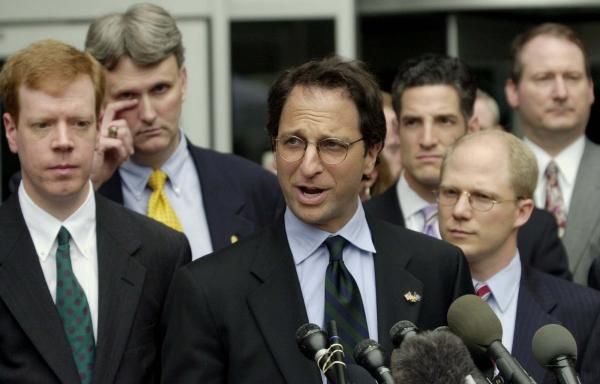 You won’t read about it much in the mainstream media, but the Enron-related criminal prosecutions increasingly smell like a rotting carcass.
You won’t read about it much in the mainstream media, but the Enron-related criminal prosecutions increasingly smell like a rotting carcass.
After Jeff Skilling was lynched by an angry mob, most of the mainstream business media moved on to other stories, such as various Wall Street firms taking write downs that are far in excess of the $1.1 billion in non-recurring 3rd quarter 2001 charges that began the media-fueled run on Enron that ended with the firm in bankruptcy and many of its executives in the cross-hairs of federal prosecutors.
Contrary to public perception, the Enron Task Force’s actual effort in proving Enron-related crimes was nowhere near as effective as its public relations campaign in demonizing the defendants in the Enron-related criminal cases.
To her credit, the Chronicle’s Kristen Hays remains one of the few mainstream media reporters who is following up on the Enron-related prosecutions.
In this recent article, Hayes reports on the oral argument at the Fifth Circuit Court of Appeals of the Department of Justice’s attempt to salvage at least a smidgen of the dubious conviction that the Task Force obtained in 2006 against former Enron Broadband executive Kevin Howard. U.S. District Judge Vanessa Gilmore threw out the conviction based largely on the Fifth Circuit’s prior decision in the Nigerian Barge case.
During oral argument on its appeal, the DOJ’s “best” argument before the Fifth Circuit panel was that the prosecution should not have given Judge Gilmore a flawed jury instruction linking the one count that it contends should survive with the four counts that the DOJ concedes should be tossed out.
As Hayes reports, “A skeptical [Fifth Circuit Judge Patrick E.] Higginbotham noted that the prosecution supported the instruction and nearly two years later on appeal is saying it shouldn’t have been given.”
As they say in appellate circles, that’s not a good signal from the bench for the DOJ.
If the Fifth Circuit does as expected and denies the DOJ’s appeal, then the DOJ will confront whether to try Howard for a third time on Enron-related charges. And given the DOJ’s track record, I wouldn’t put it past them.
Meanwhile, in a development that I didn’t see picked up by any of the mainstream media, U.S. District Judge Ewing Werlein effectively put off the trial of former Merrill Lynch bankers Daniel Bayly and Robert Furst for a year or so by granting Bayly and Furst an interlocutory appeal of a part of his recent decision denying their motion to dismiss the DOJ’s ongoing attempt to re-try them in the Nigerian Barge case. Judge Werlein’s decision puts that re-trial off for the better part of a year, at least.
Finally, as this recent post noted, Skilling’s defense team and the defense teams for the former Merrill bankers are currently sifting through the notes of FBI and Task Force interviews with former Enron CFO Andrew Fastow, who was a key witness in the Skilling trial and a key player in the Nigerian Barge trial.
Inasmuch as Task Force attorneys withheld information from those interviews from both defense teams prior to the trials in both cases, if the notes of the Fastow interviews reflect that prosecutors withheld exculpatory evidence or induced Fastow to change his story over time, then that would be strong grounds for reversal of Skilling’s conviction and dismissal of the remaining charges against the Merrill bankers. Stay tuned.
Quite a record of that Enron Task Force, eh?
Update: Larry Ribstein points out that these should have never been criminal cases in the first place.

keeping in mind that the core of the Enron fraud involved off balance sheet entities which should have been on Enron’s books, I’m wondering how it will play out with these banks taking their mortgage debt OBEs onto their balance sheets. Were they truly independent? If not, will there be prosecutions? And if so, what is the business justification for saddling stockholders with billions of dollars of losses?
it is humorous seeing the same Wall Street institutions involved in the Enron scam neck deep in the present crises. I will never forget Spitzer letting MER off the hook for a measly 100 mill and it was back to business as usual. MER and C present situation makes Jeffey and Kenny look like choirboys.
Did Fastow play the feds? Or did his wifes family call in favors? How else does he get off with such a small sentence? Skilling and Lay were doomed before feds even got to Fast Andy. Andy had to be the dumbest crook in the history of the world.
What about all the other Enron employees involved in the fraud? Wasn’t every employee of Enron Online part of sting on Wall Street? Looks like the Feds were just looking for publicity. I wonder what kind of hijinks all the ex Enroners are up to?